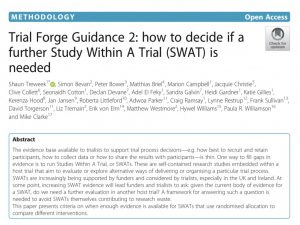
One way to fill gaps in evidence is to run Studies Within A Trial, or SWATs. At some point, increasing SWAT evidence will lead funders and trialists to ask: given the current body of evidence for a SWAT, do we need a further evaluation in another host trial? This new Trial Forge guidance provides a set of criteria for answering this question. The intention is to avoid SWATs themselves contributing to research waste
We hope the guidance will be useful to trialists, methodologists, funders, approvals agencies and others in making clear when a new evaluation of a SWAT intervention is needed and, importantly, when it is no longer a priority.
The guidance is published in Trials (https://doi.org/10.1186/s13063-019-3980-5) and is also part of the SWAT guidance package on the National Institute for Health Research (NIHR) website (https://www.nihr.ac.uk/documents/studies-within-a-trial-swat/21512).

